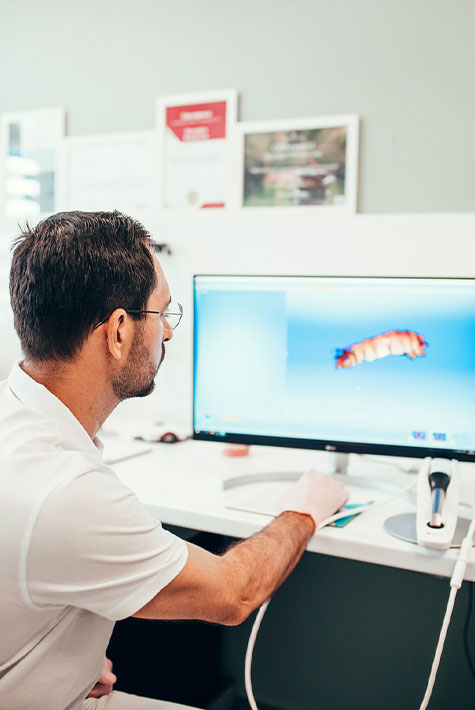Dental implants are an ideal option to replace missing or damaged teeth. They don’t have to be removed for cleaning and, more than any other restorative option, they look like your own, natural teeth.
Dental Implants


What Are Dental Implants?
A dental implant is a metal anchor used to replace missing roots. The screw-like implant is inserted into the jaw where the missing roots were and, over time, bone and gum tissue grow over it, helping to hold it in place.
A dental implant provides a very solid base for artificial replacement teeth, such as dental crowns, which are made to look like your natural teeth in size, shape and tone.
Commonly, implants are used to replace a single tooth, but there are occasions where a full rehabilitation is appropriate, wherein the implant is used to fill in gaps from missing teeth and replace those that remain. They can also be used as anchor points for dental bridges and dentures.
How Does a Dental Implant Procedure Work?
- First, a CT scan is taken to determine if there is enough bone to properly support an implant, and to work out its best position.
- The titanium implant will then be fixed into the bone. During this step, the area around the implant is numbed so no pain is experienced.
- The implant is then given around three months to become properly secured within the bone and surrounding gum tissue.
- Next, the implant is exposed at the gumline and topped with a healing cap, which makes room for the porcelain crown.
- Several weeks later, the porcelain crown or bridge is made and fixed to the implant, restoring function and aesthetics.
The entire procedure can take between three to six months, with several trips to the dentist required throughout.


Implant-Retained Dentures
After a tooth falls out, the bone and gum tissue that once held it in place gradually shrinks away, making a full denture difficult to keep in place. Ill-fitting and loose dentures make eating a chore and can make you feel self-conscious in social settings.
Dental implants make a very strong and stable anchor point for dentures, increasing their function and helping to maintain bone and gum height where they are placed.
These implants that are used to retain dentures are the same as those used to replace a missing tooth. The only difference is that the tooth-shaped crown is replaced with a small metal ball that protrudes from the gum and matches a socket embedded in the denture, allowing them to be ‘clipped’ into place.

What Is the Recovery Time for a Dental Implant Procedure?
Several factors determine the recovery time for implant procedures. These are:
- Medical and dental history
- The condition of the jawbone before the procedure
- How many teeth there are to be replaced
Recovery can span from several days to a couple of weeks, depending on circumstances. Most people feel back to their old self in around a couple of days. The jawbone and gum tissue usually take around three to six months to completely heal.
Mild pain and discomfort may be experienced for around a week after the procedure. Over-the-counter painkillers will be strong enough to provide relief.
Are There Any Risks With a Dental Implant Procedure?
For more than 30 years, dental implants have been a safe and effective solution for missing teeth. However, as with any procedure that involves exposed tissue, there is a risk of infection. That’s why it’s very important that dental implant procedures are conducted by qualified, knowledgeable dentists, like those who work at Walloon Dental.
The cost of the procedure is high when compared with other dental treatments, which is why some consider having it performed overseas where costs can be lower. This is strongly urged against, as inadequately trained dentists and inappropriate equipment can greatly increase the chance of infection.
How Long Do Implants Last?
If cared for correctly, dental implants are considered a lifetime solution. What is anchored to them – dentures, bridges, crowns – unfortunately have shorter lifespans, and will need to be replaced over time, with the same implant serving as the base.
Good oral hygiene and regular dental check-ups will determine how long implants last. If you have any questions or would like to discuss dental implants in greater detail, please call our friendly team on 07 3067 7990.

Easy Payment Options
Did you know we have flexible payment options available? You can pay for your weekday and Saturday dental treatment with Zip, Afterpay or National Dental Plan. Dental treatments are important to your overall health, and it’s best to get that toothache sorted as soon as possible. With Zip, Afterpay and National Dental Plan, the benefits include:
Health Fund Friendly
We accept all major private health funds and offer on the spot claiming with HICAPS.
We are proud to be Preferred Providers for the following health funds, meaning our patients have access to the highest rebates possible!









